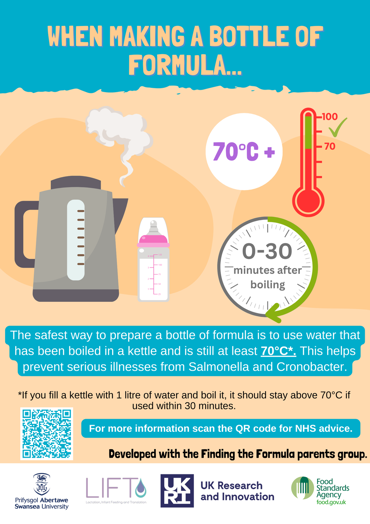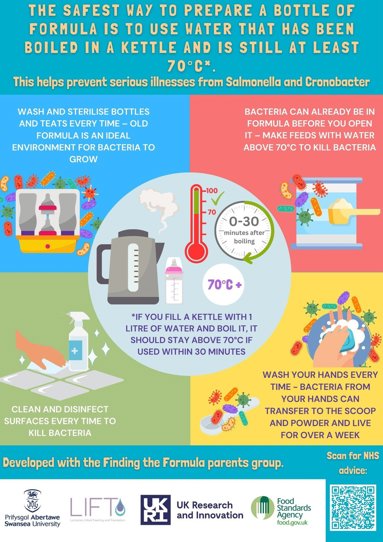Keeping everything really clean is important when formula feeding your baby. Their immune system is not as strong as yours, so even the smallest amount of bacteria could make your baby poorly. This is why bottles, teats and any other feeding equipment needs to be washed with hot soapy water and then sterilised.
 Preparing feeds safely is also very important. Feeds should be made one at a time as your baby needs them. Being aware of your baby's cues (signs they are getting hungry) will mean that you can prepare the feed before your baby gets upset.
Preparing feeds safely is also very important. Feeds should be made one at a time as your baby needs them. Being aware of your baby's cues (signs they are getting hungry) will mean that you can prepare the feed before your baby gets upset.
Watch the video below to see a parent making up a bottle of formula.
Storing Feeds
Powdered formula, even when sealed  is not sterile and can contain bacteria. Preparing the formula correctly is important as this helps to prevent your baby from becoming unwell.
is not sterile and can contain bacteria. Preparing the formula correctly is important as this helps to prevent your baby from becoming unwell.
Feeds should be made up 1 at a time, when your baby needs to be fed. This is because bacteria can grow very fast at room temperature. Leaving the feed for a while after making it can increase the chance of your baby getting an infection. Even keeping a feed in the fridge can cause bacteria to multiply.
Feeds should be kept for no longer than 2 hours after being prepared or 1 hour after you start to feed your baby.
Store unopened infant formula containers in a cool, dry, indoor place such as a kitchen cupboard. Once a container of infant formula is opened, store in a cool, dry place with the lid tightly closed. Do not store it in the refrigerator. Most formula instructions say to use the box within a month.
Making a Bottle of Formula

The safest way to prepare a bottle of formula is to use water that has been boiled in a kettle and is at least 70°C. This helps prevent serious illnesses from Salmonella and Cronobacter. If you fill a kettle with 1 litre of water and boil it, it should stay above 70°C if used within 30 minutes.
All infant formula brands are interchangeable despite the price differences. For healthy, non- or partially breastfed babies between birth and 12 months, any infant formula is suitable. The law requires that all formula complies with the same nutritional composition standards.
Choose one based on cows' or goats' milk, avoiding 'hungry baby', anti-reflux or lactose-free brands. Only use a specialised milk on the advice of a healthcare professional.
Follow-on formulas marketed for use between 6-12 months are unnecessary when infant formula is available. 'Growing up' or toddler milks should not be given to infants under 12 months of age, as they could be harmful to them. These products are not subject to the same laws as infant formulas in their labelling and ingredients, and can contain a lot of sugar.
Safe Preparation

The safest way to prepare a bottle of formula is to use water that has been boiled in a kettle and is still at least 70°C. This helps prevent serious illnesses from Salmonella and Cranobacter.
Do not keep a feed for any longer than two hours after you have made it or one hour after feeding begins. If you make the feed and your baby does not want it straight away you can place it in the fridge. Use it within the two hours or throw away and make a fresh feed when your baby is hungry.
Remember to always test the temperature of the feed against the skin on the inside of your arm before feeding your baby.
Prep Machines, Hot Taps & Baby Kettles
You may have seen formula feed prep machines or baby kettles advertised or you may have an instant boiling water tap fitted in your kitchen. Some people may tell you its a good idea to use formula preparation machines, hot taps & baby kettles to save time on making up a bottle. However, it is very important to follow safety advice.
The NHS advises against using formula feed prep machines. This is because they deliver a small shot of very hot water and then add cool water to make up the rest of the feed. This will not kill the bacteria in formula milk effectively.
The First Steps Nutrition Trust has guidance on the use of use of hot taps and baby kettles and formula preparation machines.
If your baby is less than 28 days old you can contact your local midwifery team or you can contact the Healthy Child Service team at any time following your baby's birth by calling Just One Number on 0300 300 0123 or texting Parentline on 07520 631590.
Our opening hours are 8am-6pm Monday to Friday (excluding bank holidays).
Norfolk Healthy Child Service has a team of infant feeding champions who can contact you by video call/telephone initially to discuss your questions and refer you to further help if required. All of our staff are trained to Unicef standards to provide you with the best possible breastfeeding support and advice.
It may help in the first instance to read the Essential Guide to Feeding & Caring for your Baby.
Norfolk’s Early Childhood and Family Service (ECFS) offers support for all parents and carers with children aged 0 to 5 years.
Also in this section...